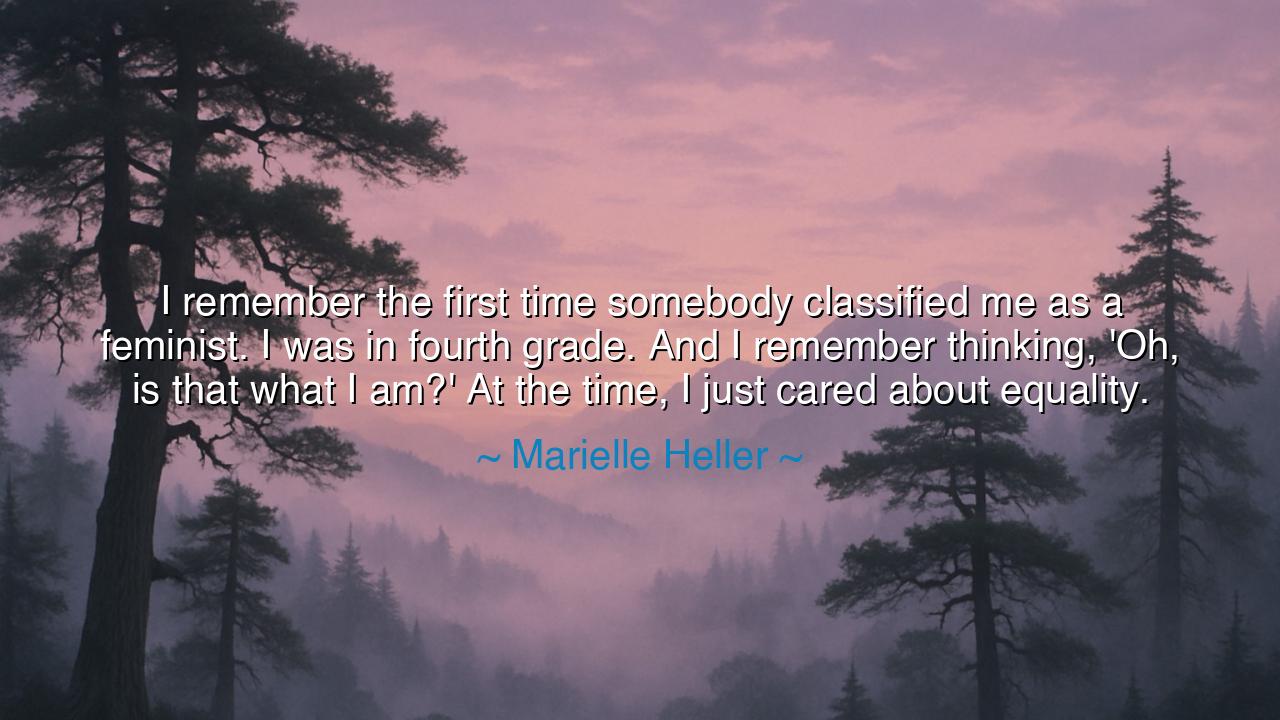
I remember the first time somebody classified me as a feminist. I
I remember the first time somebody classified me as a feminist. I was in fourth grade. And I remember thinking, 'Oh, is that what I am?' At the time, I just cared about equality.






In the tapestry of human history, the quest for equality has been one of the most enduring and profound struggles. Marielle Heller shares with us a deeply personal reflection, "I remember the first time somebody classified me as a feminist. I was in fourth grade. And I remember thinking, 'Oh, is that what I am?' At the time, I just cared about equality." These words, simple yet profound, reveal an essential truth: equality is not a label to be worn, but a fundamental belief in the worth and dignity of all people. Heller's reflection brings to light the moment when the innocent pursuit of fairness is first recognized by society and is given a name—a name that has come to carry both power and complexity.
From the beginning of time, the concept of equality has been a source of both conflict and transformation. In Ancient Greece, the great philosopher Socrates sought the truth by challenging conventional wisdom, questioning not only the gods but also the very structures that governed society. He argued for the inherent worth of the individual, yet he did not extend that same principle to women, whose voices were largely silenced. In his time, equality was seen as a privilege reserved for certain classes, and the idea of women sharing in the same rights was inconceivable. Yet, even in those ancient days, the seeds of change were being sown. Heller’s words echo this, for she too was simply seeking fairness, a concept that transcends time, and which, though often misunderstood or misclassified, remains at the core of the struggle for justice.
The concept of feminism—a term that would come to symbolize the fight for women's rights—was once seen as radical, but its roots lie deep in the ancient world. Hypatia of Alexandria, one of the most learned women of her time, defied the conventional boundaries of gender and education, rising to become a leader in her community. Hypatia's contributions were so profound that they were acknowledged by both men and women, yet she was ultimately slain by those who could not accept the equality of her intellect and influence. In her legacy, we see the seeds of the feminist movement—the belief that all people, regardless of gender, should be entitled to the same opportunities and freedoms. Heller’s reflection on the simple desire for equality carries forward this age-old struggle, reminding us that the pursuit of fairness is not about labels, but about the recognition of each individual’s value.
The beauty of Heller's statement lies in its innocence. In the fourth grade, she was not seeking to align herself with a particular movement, nor was she thinking about labels like “feminist.” She was simply a young person wanting fairness, wanting equality for all. Feminism became the label, but what Heller truly sought was the recognition of a basic truth—that all people, regardless of gender, should have the same rights, the same opportunities. This innocence is something to be cherished, for it reflects the essence of equality—a desire that is natural, intrinsic, and inherent in all people. It is not the label that matters, but the principle itself.
In modern times, we see the same struggle being fought, though the forces of oppression have shifted. Consider the story of Malala Yousafzai, a young woman who, despite the threats against her life, continued to fight for the right of girls to receive an education. Malala’s courage, born of a simple desire for fairness and equality, transcended borders and cultures. She did not need to call herself a feminist to stand for equality—her actions, her words, her very life, embodied the core values that feminism seeks to uphold. Heller’s desire for equality mirrors Malala’s in its purity: it is not about labels or ideologies, but about the deep, abiding belief that all human beings deserve justice and opportunity.
The lesson we learn from Heller is profound: the pursuit of equality is not bound by labels or movements, but is a fundamental principle that transcends time, culture, and circumstance. It is the drive to ensure that every person, regardless of gender, race, or background, is afforded the same dignity, the same rights, and the same opportunities. Whether we call it feminism, humanism, or simply fairness, the essence remains unchanged. It is the cry of every heart that desires a world of justice, a world where no one is left behind because of who they are or where they come from.
Let us then, in our own lives, take up this mantle of equality—not as a label, but as a way of being. Let us challenge the systems that seek to divide, to oppress, and to limit the potential of others. Let us see beyond the superficial distinctions of gender, race, and class, and recognize the inherent dignity of every person. In doing so, we honor the legacy of those who, like Heller, have sought not to wear a label, but to create a world where the simple principle of equality is a universal truth. In this pursuit, we will find the true meaning of justice, and we will create a society where all people can live with dignity and opportunity.






AAdministratorAdministrator
Welcome, honored guests. Please leave a comment, we will respond soon